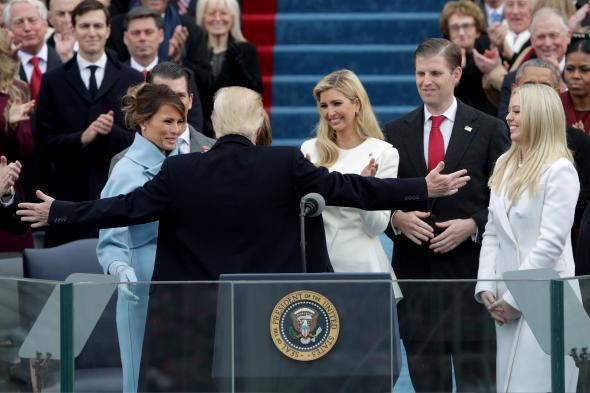The Trump administration unveiled its much-hyped tax reform plan on Wednesday. As my colleague Ben Mathis-Lilley points out, this turned out to be less an actual plan and more a one-page bullet-pointed list of proposals that the White House hasn’t really bothered to think through. That vagueness conveniently allowed Treasury Secretary Steve Mnuchin to plead ignorance when asked about the proposal’s real-world impact—not just on the average American, but also on Trump himself. “I can’t comment on the president’s tax situation since I don’t have access to that,” Mnuchin told reporters.
Trump continues to refuse to release his tax returns, so Mnuchin is partially right: no one can say for certain what specific effect Trump’s plan would have on his own fortune. Yes, it stands to reason that Trump would benefit mightily if he succeeds in his quest to lower the top individual income tax rate, slash the tax rates for so-called pass-though corporations such as his Trump Organization, and/or eliminate the alternative minimum tax he’s paid in the past. Ultimately, though, we can’t put a number on just how much Trump stands to gain without seeing his tax returns. But—but! There is at least one proposal put forth on Wednesday for which we can begin to do the Trump-benefiting math: the elimination of the estate tax.
Under the current law, an individual can leave up to $5.45 million to their heirs (a married couple can leave up to $10.9 million) without being subject to the estate tax—anything above that is supposed to be taxed at 40 percent. In reality, though, when you factor in those initial deductions along with other available tax credits, most estimates peg the effective tax rate on wealthy estates—that is the rate actually paid to the government—at closer to 19 percent. Regardless, though, most Americans won’t ever have to worry about the tax. According to the Brookings Institution-backed Tax Policy Center, only a fraction of one percent of post-death estates end up paying the tax at all.
Trump, however, isn’t most Americans. He boasts that he’s worth more than $10 billion and counting, and even the most conservative independent experts put him safely above the estate-tax minimum. As Bloomberg noted this past December after crunching the numbers, if Trump’s net-worth is the $3 billion that the financial publication estimates it is—and assuming a baseline effective tax rate of 18.8 percent—his estate would save $564 million if the tax were repealed. And if he’s really worth the $10 billion he claims? His family would save $1.9 billion. We don’t need to see Trump’s tax returns, then, to know that his tax plan would be a big, government-sponsored gift to his already wealthy children.
Know anything about a potential conflict of interest in the Trump administration? DM Josh Voorhees on Twitter, or email him at josh.voorhees@slate.com.
